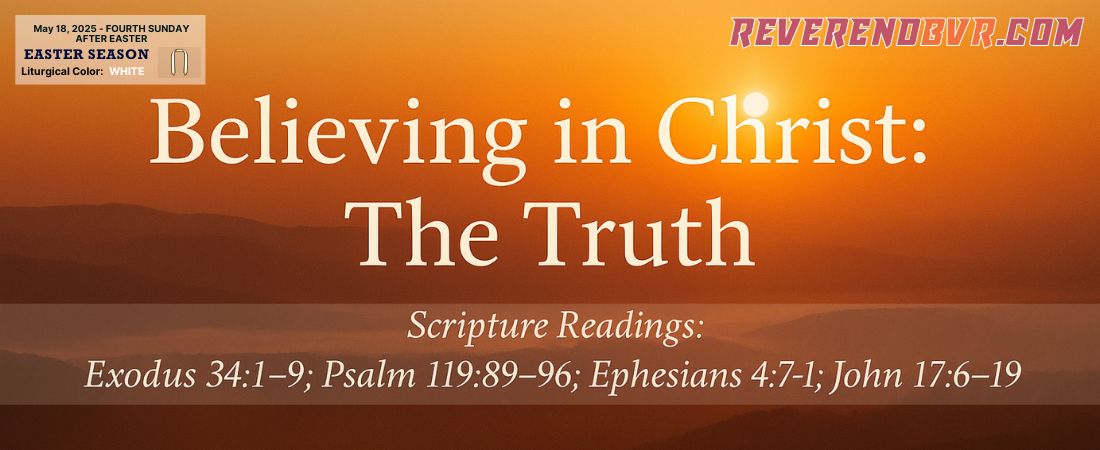Sermon Title: Believing in Christ :The Truth.
Occasion: 4th Sunday after Easter | May 18, 2025, Sunday.
Textual Foundations: Exodus 34:1–9; Psalm 119:89–96; Ephesians 4:7–16; John 17:6–19.
Original Language Reflections (For deeper study, refer to the Table of Hebrew and Greek Terms in Section 9 of the sermon).
Website: www.reverendbvr.com
Introduction
In an age saturated with information but impoverished in wisdom, the call to believe in Christ as the Truth stands as both a spiritual challenge and an existential necessity. Believing in Christ is not merely intellectual assent or emotional affirmation—it is a radical reorientation of life around the incarnate Truth. This sermon explores what it means to believe in Jesus Christ, the Truth, drawing from rich biblical texts that span the Hebrew Scriptures and the New Testament.
1. The Eternal Nature of Divine Truth (Psalm 119:89–96)
The Psalmist begins with a powerful affirmation: “Your word, LORD, is eternal; it stands firm in the heavens.” (Ps. 119:89). In the Hebrew tradition, the Word (דָּבָר, dābār) of God is not just speech but an active, creative force. The enduring nature of God’s word stands in contrast to the transient and mutable human discourse. This Psalm serves as a liturgical anchor, affirming that God’s statutes are not arbitrary but cosmic in scale, underpinning creation itself (vv. 90–91).
Thus, belief in Christ, who is described as the Logos (John 1:1), is belief in this eternal, sustaining truth. His teachings do not merely shape religious rituals—they sustain existence.
2. Truth and the Covenant: God’s Revelation at Sinai (Exodus 34:1–9)
In Exodus 34, the re-giving of the tablets after the Israelites’ idolatry underscores a profound theological principle: truth is not just propositional—it is relational.
“The LORD, the LORD, the compassionate and gracious God, slow to anger, abounding in love and faithfulness…” (Ex. 34:6)
Here, God’s self-disclosure is deeply ethical. His name embodies mercy, justice, and faithfulness. When Moses pleads with God to accompany the people despite their “stiff-necked” nature (v. 9), he is essentially appealing to God’s faithful truth—truth that forgives and renews.
This prepares us to understand Jesus as the ultimate manifestation of this divine truth—a truth not devoid of justice, but full of grace and redemption.
3. Christ: The Embodied Truth Who Gives Gifts (Ephesians 4:7–16)
In Ephesians, Paul provides a Christocentric vision of the Church grounded in Christ’s triumphant ascension: “But to each one of us grace has been given as Christ apportioned it…” (Eph. 4:7). Paul quotes Psalm 68 to describe Christ’s descent (incarnation) and ascent (resurrection and ascension), situating him as the cosmic victor who distributes gifts to build up the Church.
Apostles, prophets, evangelists, pastors, and teachers are truth-bearers, tasked with equipping the saints (v. 11). This passage ties the belief in Christ as the Truth to ecclesial maturity: “…attaining to the whole measure of the fullness of Christ.” (v. 13).
Believing in Christ means growing in Him, being anchored against doctrinal chaos (v. 14), and building up the body in love (v. 16). Truth is communal and formational.
4. Christ’s Priestly Prayer: Sanctified in Truth (John 17:6–19)
Perhaps the most poignant theological insight comes from Jesus’ high priestly prayer: “Sanctify them by the truth; your word is truth.” (John 17:17). Jesus speaks of his disciples as recipients of the Father’s word. This word, identified as truth, becomes the means of their sanctification—their being set apart for divine purpose. The Greek word for sanctify (hagiazō) implies a transformation rooted in holy reality.
Moreover, Jesus’ intercession reveals a vital truth: to believe in Him is to be in but not of the world. It is to be protected, not removed; missioned, not isolated (vv. 15–18).
5. Theological Reflection: What Does It Mean to Believe in the Truth?
- Truth as a Person, not merely a Proposition: Jesus does not merely speak the truth; He is the Truth (John 14:6). Belief in Him is existential, relational, and redemptive.
- Truth and Freedom: As Christ later says, “the truth will set you free” (John 8:32). Truth in Christ liberates from sin, falsehood, and spiritual stagnation.
- Truth and Community: Ephesians shows that truth is not private—it builds the Church. False doctrine and fragmentation arise when the body loses connection with the head, Christ.
- Truth and Endurance: Like the Psalmist, the believer must delight in God’s word, especially in affliction (Ps. 119:92–93). God’s commands have no limit (v. 96)—they are vast, living truths.
6. Application: Living the Truth in Today’s World
- In a culture that often reduces truth to subjective opinion, believers are called to embody the objective, incarnate Truth.
- Challenges—be they intellectual doubts, moral failures, or cultural opposition—are answered not with force but with faithful presence and loving witness.
- Belief in Christ the Truth means:
- Trusting His words.
- Living in the light of His teaching.
- Participating in His mission.
- Being sanctified through ongoing engagement with Scripture and the Spirit.
7. Closing Prayer
Gracious and Eternal God, You are the Truth that was, that is, and that is to come. We thank You for the revelation of Your character in Christ—the Truth made flesh. Root us deeply in Your word. Sanctify us through it. Guard us from deception and division. Make us one in Christ, mature in love, and bold in witness. As we walk in a world fraught with falsehood, let us cling to the eternal Word that stands firm in the heavens.
In Jesus’ name, the Truth and the Life, we pray. Amen.
8. Table: Summary of Key Themes
| S. No | Scripture | Theological Emphasis | Practical Application |
| 1 | Exodus 34:1–9 | Covenant and mercy: truth in divine character | Repent and walk in God’s mercy and justice |
| 2 | Psalm 119:89–96 | Word as eternal and sustaining | Anchor life in Scripture, even amid affliction |
| 3 | Ephesians 4:7–16 | Christ’s gifts for truth-bearing ministry | Embrace spiritual growth in community |
| 4 | John 17:6–19 | Sanctification through the truth | Live as consecrated people in the worl |
9. Learn Words from the Original Scriptures (For deeper understanding and meditation on today’s theme)
| S.No | Term (Click to View on BLB) | Language | Lexical Meaning |
| 1 | דָּבָר (dābār) | Hebrew | word, matter, thing; divine utterance |
| 2 | לORD (YHWH) (Implied) | Hebrew | the personal, covenantal name of God (Yahweh) |
| 3 | חֶסֶד (ḥesed) (Implied by Ex. 34:6) | Hebrew | steadfast love, mercy, covenant loyalty |
| 4 | λόγος (logos) | Greek | word, speech, divine reason |
| 5 | χάρις (charis) (Implied) | Greek | grace, favor, divine enablement |
| 6 | πνεῦμα (pneuma) | Greek | spirit, breath, wind |
| 7 | ἁγιάζω (hagiazō) | Greek | to sanctify, set apart for holy purpose |
| 8 | ἀλήθεια (alētheia) | Greek | truth, reality, divine fact |
10. Bibliography
- Brueggemann, Walter. Theology of the Old Testament: Testimony, Dispute, Advocacy. Fortress Press, 1997.
- Wright, N.T. Paul and the Faithfulness of God. Fortress Press, 2013.
- Bauckham, Richard. Jesus and the God of Israel. Eerdmans, 2008.
- Childs, Brevard S. The Book of Exodus: A Critical, Theological Commentary. Westminster Press, 1974.
- Webster, John. Holiness. Eerdmans, 2003.
For more sermons and biblical reflections, visit:
🌐 www.reverendbvr.com/sermons

